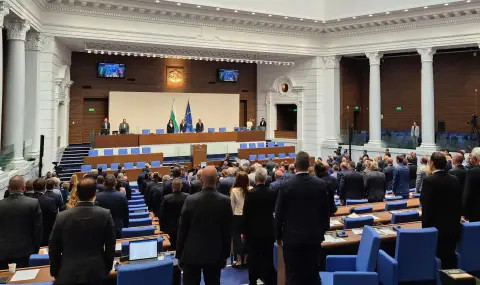Comment by Emilia Milcheva:
Electing an equidistant Prime Minister of Bulgaria is like electing an independent Prosecutor General - an impossible task. But if a Prosecutor General without dependencies is a good start and a clear goal for reforming the judicial system, a “neutral” Prime Minister is not the painkiller for the political crisis.
Equidistant, non-partisan Prime Minister?
When the co-chair of “We continue the change” (PP) Kiril Petkov says that "the way out of the political crisis is for the political forces to unite around an equidistant, non-partisan prime minister, economist or lawyer" and a common development program, he must have someone in mind. The question is can there be a "non-partisan prime minister" proposed by a political force - or will they draw names in a lottery? Even the last Bulgarian Tsar Simeon Saxe-Coburg-Gotha chose the party platform to come to power. In a parliamentary democracy, responsibility lies with the political force that has shouldered the burden of fulfilling the mandate to form a government. Who will bear responsibility for the decisions of a "neutral" prime minister, if we assume the hypothesis that a better cover for the "straw" prof. Lyuben Berov.
A non-partisan prime minister is usually appointed in crisis situations or for temporary decisions, such as the official one, which is also non-partisan according to the Constitution. But since in Bulgaria every appointment is “politics” - even competitions for school principals, the circle of individuals from which the acting prime minister is selected is, to a large extent, a function of a party or its clans. Everywhere is full of party “lieutenants”.
The parliamentary majority bears the burden
Such a “neutral” prime minister would not relieve politicians of the responsibility to make difficult and unpopular decisions that they so stubbornly avoid. For example, a schedule for decarbonization and gradual decommissioning of coal-fired power plants in the energy roadmap, where Bulgaria has only written that the thermal power plants will operate until 2038. These are some of the conditions that Bulgaria has not met in order to receive the second tranche of funds under the Recovery and Resilience Plan (RRP).
The PP-DB government, supported by GERB and MRF, although it had a majority, did not gather the political will and courage to propose, and the parliament to vote on, such a schedule. Instead, it preferred to provide millions to the energy workers from the Maritsa Basin, because they will remain without salaries, which means social tension. This practice was continued by the caretaker cabinet of Dimitar Glavchev.
The “Neutral” prime minister cannot cope with political impotence. With the argument of the enormous distrust of politicians, Bozhidar Bozanov from “Democratic Bulgaria” expanded the formula by which such a leader will be sought, to BNT: “Our idea is to unite around a non-partisan, but sufficiently recognizable public figure for prime minister, supported by a wide range of parties”.
On bTV, former Finance Minister Assen Vassilev (PP) even drew a red line - “if there is no independent prime minister like Mario Draghi or Michel Barnier”, a person with “high status”, who can put together a version for a government, they will not participate. However, Draghi and former European Commissioner and current French Prime Minister Barnier have different profiles - the former is among the most influential and competent financial leaders in the world, the latter is a politician and diplomat with strategic thinking, who carried the burden of the Brexit negotiations and does not quite fit the definition of “non-partisan”.
Is there a Bulgarian “Super Mario”
Just a few days ago, former President of the European Central Bank (ECB) Mario Draghi, who steered the euro through the financial crisis, presented his report in Brussels on large-scale private and public investments, the likes of which have not been made in Europe in the last half century. The goal is to secure an additional 800 billion euros to make the EU more competitive. Draghi, who also worked as an executive director at the World Bank, is known not only for his high professionalism but also for his firmness and determination. Many political leaders in the EU have also faced them, such as Silvio Berlusconi, Greek government leaders, and former German Finance Minister Wolfgang Schäuble.
If the ideas of a “non-partisan” prime minister like “Super Mario”, as the Italians call Draghi, are to be believed, then the politicians want to (put) a hedgehog in power…. During the “assembly”, however, leaders in the ruling majority did not gather the courage to oppose the co-chairman of the MRF and Delyan Peevski, who has been sanctioned for corruption by the US and the UK.
During the 20 months as Prime Minister of the government of national unity in Italy, Draghi imposed some reforms, including to the public administration and the tax system. Who would allow it in Bulgaria, after the pre-election politicians once again postponed the introduction of the new mechanism for forming the municipal waste fee on the principle of “polluter pays“ by a year.
With “great status”, which Asen Vassilev is talking about, is only Kristalina Georgieva, who will begin her second 5-year term as Managing Director of the IMF on October 1, 2024. But Bulgarians in such high positions in international institutions and universally recognized authorities do not meet.
Political maneuver?
The proposal for a non-partisan prime minister, launched by the PP-DB, could also be seen as a political maneuver. On the one hand, it is a means of putting pressure on other political forces to accept a broader compromise or coalition. At the same time, the PP-DB presents itself as dialogical in an attempt to win over voters disappointed by the sharp polarization and party conflicts.
But if politicians do not commit to doing the job they were elected to do, then why do they run for office?
